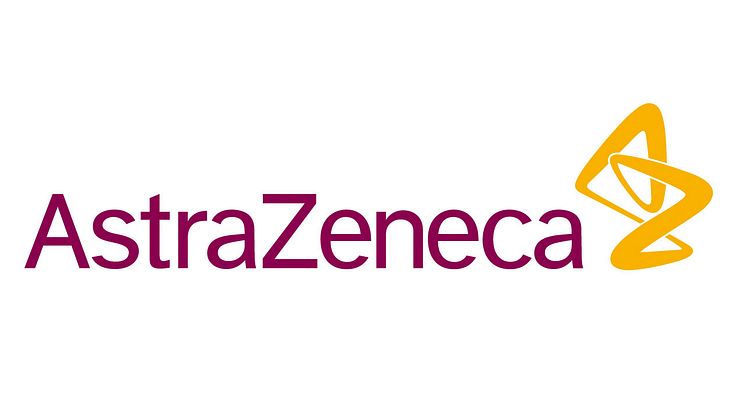
Pressmeddelande -
Tagrisso demonstrated 5.5-year median disease-free survival in the adjuvant treatment of patients with EGFR-mutated lung cancer
Nearly three in four patients treated with adjuvant Tagrisso were alive and disease-free at four years.
Exploratory results showed Tagrisso also reduced the risk of disease recurrence in the brain or spinal cord by 76% in patients with Stage II-IIIA disease.
Updated results from the pivotal ADAURA Phase III trial showed that AstraZeneca’s Tagrisso (osimertinib) demonstrated a sustained, clinically meaningful improvement in disease-free survival (DFS) compared to placebo in the adjuvant treatment of patients with early-stage (IB, II and IIIA) epidermal growth factor receptor-mutated (EGFRm) non-small cell lung cancer (NSCLC) after complete tumour resection with curative intent.
These late-breaking results will be presented today at the European Society for Medical Oncology (ESMO) Congress 2022 in Paris (abstract #LBA47).
With an additional two years of follow-up from the 2020 readout, allowing all patients the opportunity to complete three years of adjuvant treatment, Tagrisso reduced the risk of disease recurrence or death by 77% (based on a hazard ratio [HR] of 0.23; 95% confidence interval [CI] 0.18-0.30) in the primary analysis population (Stages II-IIIA) and by 73% (HR 0.27; 95% CI 0.21-0.34) in the overall trial population (Stages IB-IIIA). A median DFS of nearly five and a half years (65.8 months) was seen in both the primary and overall populations treated with Tagrisso, compared to 21.9 and 28.1 months in the primary and overall populations, respectively, treated with placebo.
While up to 30% of all patients with NSCLC may be diagnosed early enough to have surgery with curative intent, recurrence is still common in early-stage disease.1,2Historically, approximately half of patients diagnosed in Stages I-II, and three quarters of patients diagnosed in Stage III, have experienced recurrence within five years of resection.3,4
Results from an additional, prespecified exploratory analysis showed Tagrisso reduced the risk of central nervous system (CNS) disease recurrence by 76% in patients with Stage II-IIIA disease (HR: 0.24; 95% CI 0.14-0.42). At four years, 90% of patients in the Tagrisso arm were disease-free in the brain and spinal cord (95% CI 85-94%) compared to 75% of patients in the placebo arm (95% CI 67-81%). CNS disease recurrence refers to the spread of tumours to the brain or spinal cord, a frequent complication of EGFRm NSCLC associated with an especially poor prognosis.
Masahiro Tsuboi, MD, PhD, Chief and Director, Department of Thoracic Surgery & Oncology, National Cancer Center Hospital East, Japan, and principal investigator in the ADAURA trial, said: “The updated ADAURA results show us that adjuvant osimertinib not only continues to strikingly prolong the time patients with early-stage EGFR-mutated lung cancer are living cancer-free after surgery, but also continues to reduce the risk of tumours recurring in the central nervous system over time. These results reinforce adjuvant osimertinib as a standard-of-care treatment for these early-stage lung cancer patients who previously had no targeted treatment options after surgery, and who otherwise face high rates of disease recurrence.”
Susan Galbraith, Executive Vice President, Oncology R&D, AstraZeneca said: “It is remarkable that just two years ago, patients with early-stage EGFR-mutated lung cancer had no targeted treatment options after surgery. Now, around the world, patients have access to Tagrisso and its added benefit of protecting the brain and spinal cord. We look forward to mature overall survival results for ADAURA in due time, but our research and commitment to early-stage lung cancer patients continue through our broader Tagrisso programme, which is investigating a prolonged duration of post-surgery treatment and the potential role of adjuvant Tagrisso in even earlier stages of disease.”
Summary of efficacy resultsi:
Tagrisso | Placebo | |
DFS Stages II-IIIA (primary population) | (n=233) | (n=237) |
HR (95% CI) | 0.23 (0.18, 0.30) | |
Median DFS (months) | 65.8 (54.4-NCii) | 21.9 (16.6-27.5) |
Landmark DFS rates (95% CI) | ||
Two years | 90% (85-93) | 46% (40-52) |
Three years | 84% (78-88) | 34% (28-40) |
Four years | 70% (62-76) | 29% (23-35) |
DFS Stages IB-IIIA (overall population) | (n=339) | (n=343) |
HR (95% CI) | 0.27 (0.21, 0.34) | |
Median DFS (months) | 65.8 (61.7-NC) | 28.1 (22.1-35.0) |
Landmark DFS rates (95% CI) | ||
Two years | 90% (86-93) | 55% (49-60) |
Three years | 85% (80-88) | 44% (39-50) |
Four years | 73% (67-78) | 38% (32-43) |
CNS DFS Stages II-IIIA | (n=22; 9%) | (n=41; 17%) |
HR (95% CI) | 0.24 (0.14, 0.42) | |
Landmark CNS DFS rates (95% CI) | ||
Two years | 98% (95-99) | 81% (75-87) |
Three years | 97% (93-98) | 77% (70-83) |
Four years | 90% (85-94) | 75% (67-81) |
|
Probability of CNS recurrenceiii Stages II-IIIA | (n=233) | (n=237) |
Three years | 2% (0.9-5) | 13% (8.5-18.5) |
i. Data cut-off: April 11, 2022
ii. NC: Not calculable
iii. Defined as the probability of observing a CNS recurrence event, conditional on the patient not experiencing a competing risk event (non-CNS recurrence and death by any cause)
The safety and tolerability of Tagrisso in this trial were consistent with its established profile. No new safety concerns were reported with an extended treatment duration. Adverse events at Grade 3 or higher from all causes occurred in 23% of patients in the Tagrisso arm versus 14% in the placebo arm.
Notes
Lung cancer
Lung cancer is the leading cause of cancer death among both men and women, accounting for about one-fifth of all cancer deaths.5 Lung cancer is broadly split into NSCLC and small cell lung cancer, with 80-85% classified as NSCLC.6 The majority of all NSCLC patients are diagnosed with advanced disease while approximately 25-30% present with resectable disease at diagnosis.1,2
Among patients with resectable tumours (Stage IB-IIIA), the majority of patients eventually develop recurrence despite complete tumour resection and adjuvant chemotherapy.3 In the absence of organised screening efforts, early-stage lung cancer diagnoses are often only made when the cancer is found on imaging for an unrelated condition.7,8
Approximately 10-15% of NSCLC patients in the US and Europe, and 30-40% of patients in Asia have EGFRm NSCLC.9-11 These patients are particularly sensitive to treatment with an EGFR-tyrosine kinase inhibitor (EGFR-TKI) which block the cell-signalling pathways that drive the growth of tumour cells.12
ADAURA
ADAURA is a randomised, double-blind, placebo-controlled, global Phase III trial in the adjuvant treatment of 682 patients with Stage IB, II, IIIA EGFRm NSCLC following complete tumour resection and, at physicians’ and patients’ discretion, adjuvant chemotherapy. Patients were treated with Tagrisso 80mg once-daily oral tablets or placebo for three years or until disease recurrence.
The trial enrolled in more than 200 centres across more than 20 countries, including the US, in Europe, South America, Asia and the Middle East. The primary endpoint was DFS in Stage II and IIIA patients and a key secondary endpoint was DFS in Stage IB, II and IIIA patients.
Though the primary data readout was originally anticipated in 2022, data from the trial were first reported early in 2020, following a recommendation from an Independent Data Monitoring Committee (IDMC) based on its determination of overwhelming efficacy. The trial is ongoing and will continue to assess the secondary endpoint of OS.
Tagrisso
Tagrisso (osimertinib) is a third-generation, irreversible EGFR-TKI with proven clinical activity in NSCLC, including against central nervous system metastases. Tagrisso(40mg and 80mg once-daily oral tablets) has been used to treat more than 600,000 patients across its indications worldwide and AstraZeneca continues to explore Tagrisso as a treatment for patients across multiple stages of EGFRm NSCLC.
In Phase III trials, Tagrisso is being tested in the neoadjuvant resectable setting (NeoADAURA), in the Stage IA2-IA3 adjuvant resectable setting (ADAURA2), in the Stage III locally advanced unresectable setting (LAURA), and in combination with chemotherapy (FLAURA2). AstraZeneca is also researching ways to address tumour mechanisms of resistance through the SAVANNAH and ORCHARD Phase II trials, and the SAFFRON Phase III trial, which test Tagrissogiven concomitantly with savolitinib, an oral, potent and highly selective MET TKI, as well as other potential new medicines.
AstraZeneca in lung cancer
AstraZeneca is working to bring patients with lung cancer closer to cure through the detection and treatment of early-stage disease, while also pushing the boundaries of science to improve outcomes in the resistant and advanced settings. By defining new therapeutic targets and assessing innovative approaches, the Company aims to match medicines to the patients who can benefit most.
The Company’s comprehensive portfolio includes leading lung cancer medicines and the next wave of innovations including Tagrisso(osimertinib) and Iressa (gefitinib); Imfinzi (durvalumab) and tremelimumab; Enhertu (trastuzumab deruxtecan) and datopotamab deruxtecan in collaboration with Daiichi Sankyo; Orpathys (savolitinib) in collaboration with HUTCHMED; as well as a pipeline of potential new medicines and combinations across diverse mechanisms of action.
AstraZeneca is a founding member of the Lung Ambition Alliance, a global coalition working to accelerate innovation and deliver meaningful improvements for people with lung cancer, including and beyond treatment.
AstraZeneca in oncology
AstraZeneca is leading a revolution in oncology with the ambition to provide cures for cancer in every form, following the science to understand cancer and all its complexities to discover, develop and deliver life-changing medicines to patients.
The Company’s focus is on some of the most challenging cancers. It is through persistent innovation that AstraZeneca has built one of the most diverse portfolios and pipelines in the industry, with the potential to catalyse changes in the practice of medicine and transform the patient experience.
AstraZeneca has the vision to redefine cancer care and, one day, eliminate cancer as a cause of death.
AstraZeneca
AstraZeneca (LSE/STO/Nasdaq: AZN) is a global, science-led biopharmaceutical company that focuses on the discovery, development, and commercialisation of prescription medicines in Oncology, Rare Diseases, and BioPharmaceuticals, including Cardiovascular, Renal & Metabolism, and Respiratory & Immunology. Based in Cambridge, UK, AstraZeneca operates in over 100 countries and its innovative medicines are used by millions of patients worldwide. Please visit astrazeneca.com and follow the Company on Twitter @AstraZeneca.
Contacts
For details on how to contact the Investor Relations Team, please click here. For media contacts, click here.
References
- Le Chevalier T. Adjuvant Chemotherapy for Resectable Non-Small-Cell Lung Cancer: Where is it Going? Ann Oncol. 2010;21:196-8.
- Cagle P, et al. Lung Cancer Biomarkers: Present Status and Future Developments. ArchivesPathology Lab Med. 2013;137:1191-1198.
- Pignon JP, et al. Lung Adjuvant Cisplatin Evaluation: A Pooled Analysis by the LACE Collaborative Group. J Clin Oncol. 2008;26:3552-3559.
- Peters, S. Lungscape: resected non-small-cell lung cancer outcome by clinical and pathological parameters. Thorac Oncol. 2014;9(11):1675-84.
- World Health Organisation. International Agency for Research on Cancer. All Cancers Fact Sheet. Available at https://gco.iarc.fr/today/data/factsheets/cancers/39-All-cancers-fact-sheet.pdf. Accessed August 2022.
- American Cancer Society. What Is Lung Cancer? Available at: https://www.cancer.org/cancer/lung-cancer/about/what-is.html. Accessed August 2022.
- Sethi S, et al. Incidental Nodule Management – Should There Be a Formal Process? Journal of Thorac Onc. 2016:8;S494-S497.
- LUNGevity Foundation. Screening and Early Detection. Available at https://lungevity.org/for-patients-caregivers/lung-cancer-101/screening-early-detection. Accessed August 2022.
- Szumera-Ciećkiewicz A, et al. EGFR Mutation Testing on Cytological and Histological Samples in Non-Small Cell Lung Cancer: a Polish, Single Institution Study and Systematic Review of European Incidence. Int J Clin Exp Pathol. 2013:6;2800-12.
- Keedy VL, et al. American Society of Clinical Oncology Provisional Clinical Opinion: Epidermal Growth Factor Receptor (EGFR) Mutation Testing for Patients with Advanced Non-Small-Cell Lung Cancer Considering First-Line EGFR Tyrosine Kinase Inhibitor Therapy. J Clin Oncol. 2011:29;2121-27.
- Ellison G, et al. EGFR Mutation Testing in Lung Cancer: a Review of Available Methods and Their Use for Analysis of Tumour Tissue and Cytology Samples. J Clin Pathol. 2013:66;79-89.
- Cross DA, et al. AZD9291, an Irreversible EGFR TKI, Overcomes T790M-Mediated Resistance to EGFR Inhibitors in Lung Cancer. Cancer Discov. 2014;4(9):1046-1061.
Ämnen
Kategorier
Om AstraZeneca
AstraZeneca (LSE/STO/Nasdaq: AZN) är ett globalt, innovationsdrivet bioläkemedelsföretag med fokus på forskning, utveckling och marknadsföring av receptbelagda läkemedel för sjukdomar inom terapiområdena Onkologi, Sällsynta sjukdomar och Bioläkemedel, inklusive kardiovaskulära sjukdomar, njursjukdomar och metabola sjukdomar (CVRM) samt Andningsvägar och Immunologi. AstraZeneca är baserat i Cambridge i Storbritannien och bedriver verksamhet i över 100 länder. Dess innovativa läkemedel används av miljontals patienter över hela världen.
Mer information finns på: www.astrazeneca.com och www.astrazeneca.se. Du kan även följa oss på twitter https://twitter.com/AstraZenecaSE



